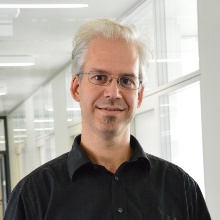The Director of the new Institute of Medical Device Technology at the University of Stuttgart, Prof. Peter Pott, is pleased that he has been given a free hand to build the institute according to his own ideas and initiative. “I have to build this institute from scratch,” the Mannheim native explains. The facility on Pfaffenwaldring the institute moved into had burned out completely nearly three years ago.
This is the first professorship for the engineering scientist. After his habilitation, he first took a little detour into Industry – not completely of his own volition, as he admits. The appointment process took so long, he remembers, that he almost stopped believing in the position. Which may have been related to the fact that the professorship did not even exist before.
Premiere for professorship for medical device technology
Regarding content, Pott is not starting from zero, because the bachelor’s and master’s programs in medical technology already exist. He is already giving a lecture series this winter semester on the basics of machine engineering, is responsible for establishing another on the topic of medical device technology, and is in the process of developing yet a third lecture series on medical robotics. He will also be conducting practical trials, which may be offered as early as the summer semester. “I take the preparatory work my colleagues have done and build on it. This does not give me a lot of leeway, because the content of the individual teaching modules are relatively fixed,” he describes his teaching responsibilities.
Significance of medical technology in Baden-Württemberg
Medical technology plays a large economic role in the state of Baden-Württemberg. The inter-university degree program Medical Technology, which the Universities of Tübingen and Stuttgart offer jointly, has reacted to that development. For the bachelor’s program, Students move between the universities, for the master’s program they decide on one of the institutions. In Stuttgart, the focus is on technology, while Tübingen concentrates more on physics, radiation physics, and bio-technology.
The institute has recently added a secretary, and Peter Pott’s first scientific employee came on board in November. By the beginning or middle of next year, four more next generation scientists will join the team. “The more people we have, the more they can draw from my idea pool or bring in their own ideas, so we can build a powerful team,” Pott is pleased to say.
Focus on Medical Robotics
With regard to his research, Pott has a free hand, and is focusing strongly on medical robotics. In his critical view, this is a very broad and complicated field that is very much driven by marketing concerns and not as much by medical interests. But he stands behind robotics all the way: “I believe that the use of robotics in the OR makes a lot of sense. At the same time, none of us are quite what shape it will take.”
Experimental OR on Pfaffenwaldring
Pott considers bio-medical actuator technology to be an important topic at the institute. The field is about how drives must be designed, what operating principles apply, and how they must be used in order to interact with people. This is part of the reason Pott wants to establish an experimental OR at the institute. The focus: the interface between man and machine. “This interface is bi-directional, so it receives – that is the sensor technology, or it emits – that’s the actuator technology. So there is always interaction with the real world. That means it needs power and kinetic momentum,” Pott describes the research topic. Another pillar of his research is advanced light microscopy, which he works on in cooperation with Prof. Alois Herkommer of the Institute of Applied Optics.
Reluctant technology transfer
The researcher does not believe in secrecy and the attitude “We can do better on our own”. Mid-sized companies in Germany are of great economic importance, and need to fundamentally change its attitude toward university research and cooperation. They need to move away from "It can’t be good because we didn’t invent it” and toward more cooperation and openness toward innovation.
Pott criticizes the fact that university and economic research and development cultures do not yet work well together. Both sides, he thinks, should take a look at their own behavior. “The engineering sciences are full of smart people who want to advance a good thing. Why don’t we do it together? Be it in the form of classic contract research, joint projects with each side financing its own efforts, or in the form of joint financing,” he appeals.
Peter P. Pott
Prof.Head of Institute


